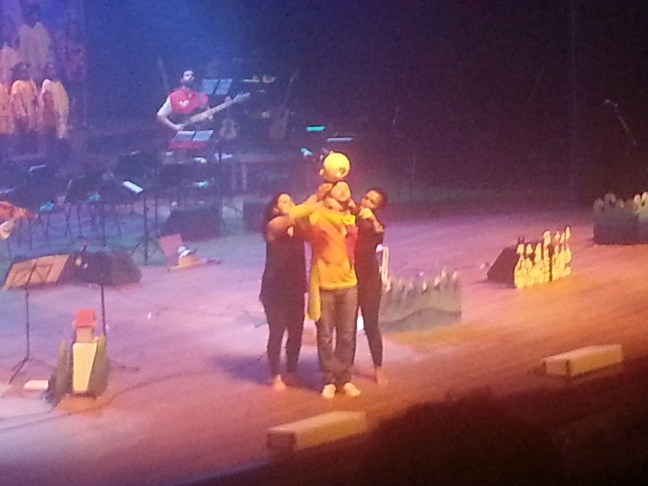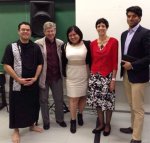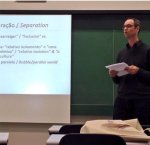
ISME 2014 and the Sistema Special Interest Group have both drawn to their conclusion in Porto Alegre. Here, for your reading enjoyment, are the relative highlights. And the lowlights.
Good week for:
Genuine inquiry. At least, within the Sistema Special Interest Group which was merciless when it came to ideas without substantiation, suspect, invalid or discredited sources, and the usual “everything is awesome” narrative that permeates the vast majority of the Sistema-related discourse elsewhere. Basic assumptions were challenged, with surprising and intriguing conclusions, and new ideas abounded. The three symposia on International or National-level Sistema cooperation, Pedagogy and Practice within Sistema, and Sistema in indigenous communities collectively could provide for years of heated discussion. But with a crowd including Richard Hallam, Andrea Creech, Geoff Baker, Graça Mota, Tanya Derksen, Adena Portowitz and many others, this shouldn’t come as a surprise.
Bad week for:
The academic/practitioner false dichotomy. If nothing else, the week made clear that uninformed practice, no matter how passionate and well-intentioned, is nothing short of dangerous. And the practitioners (at least, those who attended the Friday sessions, which excluded the North American contingent) agreed.

Good week for:
Cultural sensitivity. At least, again within Sistema, thanks in largest part to an outstanding presentation by Sistema Aotearoa, given by Joe Harrop and Ros Giffney. If you want to understand how to interface with an indigenous population, being mindful of issues of colonialism or cultural integration without being paralyzed into inaction, contact them. Just brush up on your Maori first.
Bad Week for:
Gender equity. A faculty member from a London-based popular music school noted the absence of women students in the institution majoring on guitar, bass guitar and drums. He quantified the problem and then contextualized it academically through the lens of Bourdieu and concepts of masculine domination. When I asked him publicly at the end of his presentation about what he himself intended to do about the problem at his school, his response was “Get my students to reflect on it. I hope that’s not a cop-out.” You know what? It is. Runner up: the Scottish musicians at the closing ceremony. Pretty female vocalists and fiddlers in short skirts. All-male brass section… in long pants. They could at least have all decked out in kilts.
Good week for:
Elaine Chang Sandoval. Elaine, entering the CUNY PhD program in ethnomusicology, gave a highly succinct, thoughtful and logical presentation on cosmopolitanism as relating to Sistema, but more than providing a collection of quotations from various academic sources, she also presented – and substantiated – something new.
Bad week for:
Graduate students in general. With the exception of Elaine, the approach at ISME for the vast majority of student presentations was that of aggregation. Put together enough citations or numbers and behold! A paper! New ideas or original conclusions, or any forms of actual intellectual synthesis, were in very short supply in this crowd.

Good week for:
Research. For the first time ever, to my knowledge, a research team presented a view of Sistema that entertained the null hypothesis – that is, the possibility that none of the activities undertaken by the program they reviewed actually generated social change. As crazy as it sounds, this is the first step to achieving real social impact.
Bad week for:
Mathematics. The same research team presented a paper in which they claimed a Spearman correlation coefficient of -0.18 was “significant.” It is not. As correlations go, it is utterly insignificant. This isn’t a matter of opinion or interpretation, just fact. They followed that assertion with another claiming that a correlation coefficient 0.269 is also meaningful. Wrong again. This is the kind of thing that gives music educators and music researchers a bad reputation.
Good week for
The cab drivers in Porto Alegre, who must have made a fortune off the ridiculous choice of location on behalf of the Brazilian (dis)organizers of the conference.
Bad week for:
Live music making. The opening ceremonies featured an interminable display of Brazilian pseudo-pop/folk/rock music that was technically excellent in production values but very short on artistic or aesthetic ones. Special mention must be made of the cubist Charlie Brown puppet whose frequent appearances on stage kicked off a week of inquiry by repeatedly provoking the question “Why????” Runner up: the musicians from Scotland at the closing ceremony who actually made Scottish folk music sound boring. Why did the eleven of them need a conductor? (Hint: they didn’t. The conductor needed them.)
Ugly week for:
University professors – who wandered into sessions late, held loud side conversations during presentations and engaged in other forms of behaviour for which they would normally publicly crush an undergraduate student in their own classes. Special mention has to go to the professor from the Frost School of Music in Miami. If you’re going to play Sudoku on your tablet or repeatedly allow your cell phone to chime while someone is presenting, you might want to take off your name badge so you don’t cast your institution into disrepute with your arrogance and disrespect, no matter how bad the presentation is.
Changing the world is always going to be good, bad and ugly – seems like you are well on the way to making it ‘good’. Next comes the making it ‘excellent’. Difficult fun…
Jonathan, thanks for posting your characteristically-clear opinions about the presentations (and taxis) in Porto Alegre. One followup question jumps out to me: What do you mean by “uninformed practice” in your sentence: “uninformed practice, no matter how passionate and well-intentioned, is nothing short of dangerous”?
All arts education practice is informed by many things–do mean practice that is not informed by the things that you prefer is dangerous? Or practice that is not based in research-affirmed pedagogy is dangerous? If so, that probably negates almost all the Sistema practice in the world, labeling it as dangerous, since little Sistema practice is research-affirmed at this point. Actually that view would label as “dangerous” most of the arts education practiced around the world. I assume you don’t mean that.
In my experience neither the grandmother teaching three kids to play the ukulele in Hawaii, nor the passionate Sistema teachers working with a youth orchestra in Campos, Brazil, are dangerous, even though their practices are not informed by research.